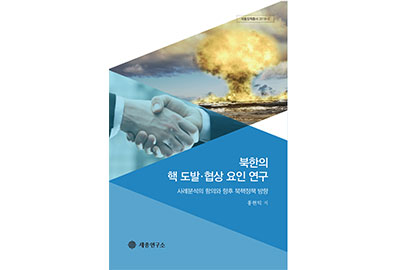A Study on North Korea’s Factors for Provocations and Negotiations regarding Nuclear Weapons: Implications of Case Analysis and Future Directions for South Korea’s Policy on North Korea
Currently, in the early weeks of 2018, it is almost impossible to achieve denuclearization of North Korea at once and North Korea’s advancement and completion of nuclear arsenal cannot be overlooked as now. Hence, it is wise to deter North Korea from carrying out another provocative act first and then move on to induce the ultimate goal of denuclearization. In this regard, the study, focusing on the fact that the South Korean and American policy on North Korea have had considerable, if not decisive, influence on North Korea’s foreign policy, delves into the questions of by which means, how, and in what point in time has North Korea changed its attitude toward provocations, negotiations, and agreement regarding its nuclear development.
To this end, the study, answering the question of in what situation does North Korea’s foreign policy diverge between provocations and compromise, selects cases of major provocations and compromises since the North Korean nuclear issue emerged in the early 1990s. For each case, it examines the South Korean and American policies toward North Korea that influenced North Korea’s change in attitude and analyzed the influence. Taking a comparative analysis of the conclusions drawn from each case, the study addresses the general nature of policy decisions regarding the North Korean nuclear issue.
It makes several concluding remarks as the following. First, North Korea engaged in a provocative act when the U.S. exerted strong pressure on it even if the inter-Korean relations were fine. North Korea was keen on engaging in dialogue with the U.S. and making compromises when the U.S. actively pursued to negotiate with North Korea even when the inter-Korean relations were strained by South Korea’s hardline stance. Finally, if the U.S. showed reticent to compromises, it required the South Korean government’s all-out diplomacy and firm determination to lead to compromises and agreements on the North Korean nuclear issue. Overall, the study confirms that the North Korea’s attitude and behavior regarding its nuclear program were swayed more by the U.S. policy concerning North Korea than that of South Korea.
Moreover, as the North Korean regime demanded more concessions for its nuclear issue as its nuclear capabilities advanced, negotiations have become difficult as time went by and the cost incurred to South Korea and the U.S. for the compromise has increased unless North Korea succumbed to them. Accordingly, Seoul should seek a more proactive and creative approach to the peaceful solution of the North Korean nuclear problem with the confidence that it already outclassed Pyongyang on the competition of systems. It should employ a phased approach with the suspension as the middle stage, design a ROK-U.S.-China trilateral comprehensive package plan that contains inclusive security-to-security exchange based on mutual security and the ‘action-for-action’ formula, and suggest this along with an alternative plan, pressuring North Korea to abandon its nuclear ambitions. The terms of the agreement should be flawless and should entail flexible management to guarantee success. Evidently, in any case, the South Korean government should prevent the worst case scenario from happening.
Volume: 2018-2
Publisher: The Sejong Institute
Publication Date: February 5, 2018
Paperback, 170 pages
